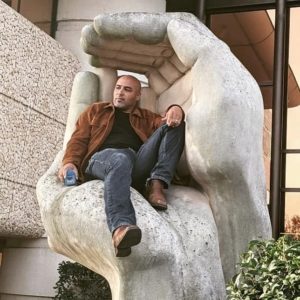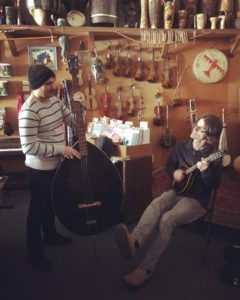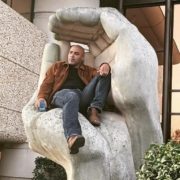Peter Harper – Part One: Connecting to American Roots
 Peter Harper is a self-described untrained musician, yet he knows trade secrets like playing ukulele at red lights. He’s a well-loved touring performer in France, interviewed by the likes of France24 and France Bleu Pays Basque. His website, peterharper.net, is in two languages, and so is the love he receives on social media.
Peter Harper is a self-described untrained musician, yet he knows trade secrets like playing ukulele at red lights. He’s a well-loved touring performer in France, interviewed by the likes of France24 and France Bleu Pays Basque. His website, peterharper.net, is in two languages, and so is the love he receives on social media.
He was touring in France when Joni Kelly connected us on Facebook. I followed so I’d know when he landed stateside, and that’s where I found Peter’s call for voices. He laid down his own vocal track in a video, asking us to sing along, record ourselves, and send it in. Of course I did.
Peter believes interaction is fundamental to all forms of art. He told me “painting, drawing, sculpture are all just veins that ultimately lead back to the heart…” and that we could start anywhere and talk about anything.
So I started by asking about French rap.
(This does come around to Folk music; @PETERHARP3R will tell you how & why.)
PH: really, you gotta go back to jazz, which then takes you back into kind of gypsy jazz…the way that I understand it is you had a lot of Italian influence that came up through Europe. And so to take this back even further, you’ve got a lot of African influence that comes into Italy. And then you have a lot of Italian influence that comes up into France.
The French are very regulated: they literally have a committee of people that determines whether new words are masculine or feminine. Oddly enough, it’s mixed between that structure and freedom of existence and the right to live. The French are a very free people, with a structured society. So it’s interesting, the dichotomy between those two things. Strong personalities.
…so you have classical music; it’s very strong. You have structured music; it’s very strong. You have all this knowledge and it gets put into this very specific space. You play everything in that space that way.
When this influence comes up in this jazz movement…what happens is, the French kind of go wild for it. Jazz comes along and it is just the exact opposite…it’s freedom of all the things…
Me: “We’re gonna play all the way around the outside of that space.”
PH: yeah, and “Sometimes we’ll go into it, but it’s just to mess with you!” So jazz comes into the picture, and it’s just like…WHOA. What is this sound? And it’s making us feel things that we live but that are outside of how we live, right? Again that dichotomy of “we’re free people, but we’re really structured.” So now here’s jazz, which is this free sound, but also simultaneously very structured, in a very abstract, nonstructural way, right? Culturally, it sort of fits right into France.
But then…you know blues, jazz as we know it in the US, it’s just this amalgamation of pressure that’s building. And the Blues forms, and the Rock and Roll forms, and Rap sort of is a tangent off of that same blues thread.
So you’ve already got this influx of like Louis Armstrong coming into France and having a huge impact; you’ve got Jimi Hendrix in Europe having a huge success before he was a success here in the US…
Me: Josephine Baker belongs in there.
PH: That’s exactly right. You’ve already got this understanding of Black American society, and how slavery has impacted America; it’s already traveled to France, and they understand conceptually what’s been going on, and what it means. They’ve been colonizers, they understand that kind of life from a different perspective, even though as colonizers the French were kind of unique in a strange way. Not to say that they were more gentle, but to say that if you spoke French, they were more willing to integrate you into society (as opposed to if you didn’t speak French…) It was like, “well maybe if you’re smart enough to learn this, maybe you’re one of us.” There was some openness to that.
But when the Americans started travelling over to France, and Jazz was already there – there was already a space for them, through the jazz that had come up through Italy. There was already rooms built, and audiences waiting.
The distinction is: American Jazz, and American Soul, and American Rap, it arrives with an intensity that doesn’t exist anywhere else in the world, right? Which is why we have the origins of a specific kind of sound. This kind of post-slavery pressure, post-oppression expression is something that doesn’t exist in the same way in any other country. For all the tragedy, and all the travesty, it also leaves us with this really beautiful expression, this creation. And that’s the nature of art, right? To bloom out of the deepest, darkest shit.
So all these things start to arrive chronologically on French soil, and again you’re talking about a very passionate people, a people when it comes to socialism, when it comes to equal rights, when it comes to having a life they can appreciate & feel freedom within…you get this influx into France with these musicians, with this culture, with this sentiment, and it resonates with them in a way that is exceptionally profound. Right? They get it. They get the struggle, they appreciate, they respect the struggle, so when it arrives in the form of art, they also embrace it. They as much as humanly possible participate in it.
So, leaving that realm – Jazz, Rap, hiphop – leaving that realm and coming into Folk music, I think that folk music, especially black folk music, is something that’s so foreign.

Peter and Joti Rockwell
The lyrics that I write, the songs that I write, the melodies that I choose…you know, I’m an untrained musician. I can’t read music; I can’t write music; I’m a guy who picked up a guitar and just started playing it, and figuring out how to find sounds that I liked. And then turned those sounds into songs. Right? That’s as folk as it gets. And it’s so unstructured. I’ve had to create my own system of tablature to write down the music that I discovered. It’s just all in my own world, creating my own space in my own existence of sound.
Me: The word that I like for this, and I think you’ll like it too, is vocabulary. Paint is a vocabulary; the scratchboard I do is a vocabulary; poetry is a vocabulary. And so you’re building your own Peter Harper Vocabulary.
PH: That’s exactly right. And when I die, and people have to transcribe it & figure it out, I don’t envy them. But that’s not my problem! One of the guys in my band is a musicologist – his name is Joti Rockwell – at Pomona College. I’ll bring him a new song and say, “Hey, I just wrote this song.” So he sits down with my songs and he’s like… “WHOA. How did you get this chord? What is this chord?” I’m like, “I DON’T KNOW. It just was the only thing that sounded right and fit in the moment, right?”
Me: How does all of this we’ve been talking about – and we’re talking about the Peter Harper Vocabulary – translate into bronze?
Continue to Part Two, where we’ll discuss bronze casting, Tiffany knock-offs & Nazi immigrants, and more!













